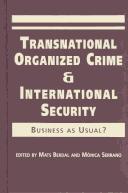| Listing 1 - 3 of 3 |
Sort by
|
Book
ISBN: 9460949096 9789460949098 9789462360341 9462360340 Year: 2013 Publisher: The Hague : Eleven International Publishing,
Abstract | Keywords | Export | Availability | Bookmark
 Loading...
Loading...Choose an application
- Reference Manager
- EndNote
- RefWorks (Direct export to RefWorks)
This book examines the use of liaison officers in police cooperation. The book's contributors, both eminent academics and seasoned practitioners, present their findings from a wide range of geographical and functional viewpoints. Students and law enforcement professionals are made familiar with the blue web of policing across the world. The book offers a considerable variety of perspectives, ranging from institutional to informal, and from sociological to psychological. The detailed accounts form an inspiring collection on contemporary practices of liaison officers that, not only includes orig
Police --- Security, International. --- Law enforcement. --- Enforcement of law --- Criminal justice, Administration of --- Collective security --- International security --- International relations --- Disarmament --- International organization --- Peace --- Cops --- Gendarmes --- Law enforcement officers --- Officers, Law enforcement --- Officers, Police --- Police forces --- Police officers --- Police service --- Policemen --- Policing --- Criminal justice personnel --- Peace officers --- Public safety --- Security systems --- International cooperation. --- Legal status, laws, etc. --- Internationale samenwerking. --- Politie. --- internationaal recht. --- politie.
Book
ISBN: 3031191773 3031191765 Year: 2023 Publisher: Cham, Switzerland : Springer International Publishing,
Abstract | Keywords | Export | Availability | Bookmark
 Loading...
Loading...Choose an application
- Reference Manager
- EndNote
- RefWorks (Direct export to RefWorks)
“Anyone curious about how plural policing unfolds in times of crisis should read this book. Experts empirically describe the dynamics during the fight against COVID-19 in 9 countries and show how existing trends and patterns in plural policing are confirmed or not, making it an attractive read. It reveals an intriguing patchwork and generates insights for academics and practitioners about the (non-)active role of a diversity of actors in the governance of security during crises. This collection contains several insights and lessons learnt for scholars as well as practitioners of policing.” —Marleen Easton, Professor and head of the research group 'Governing and Policing Security' (GaPS) at the Department of Public Governance and Management at Ghent University, Belgium This book critically examines how countries across Europe have dealt with the COVID crisis from a policing and security perspective. Across the chapters, contributors from different countries examine the data, press coverage, and provide professional observations on how policing, law enforcement, police powers and community relations were managed. They focus on how security and governmental actors often failed to align with the formal scripts that were specifically designed for crisis-management, resulting in the wavering application of professional discretion and coercive powers. Their different approaches were evident: in some regions police were less dominantly visible compared to other regions, where the police used a top-down visible and repressive stance vis-à-vis public alignment with COVID rules, including the imposition of lockdown and curfews. Some contributors draw on data from the COROPOL (Corona Policing) Monitor which collated data on crime, plural policing and public order in Europe and around the world during the early phases of the COVID crisis. Overall, this book seeks to provide comparative critical insights and commentary as well as a practical and operational understanding of security governance during the COVID-19 crisis and the lessons learned to improve future preparedness. Monica den Boer is Professor of Military Policing Operations at the Netherlands Defence Academy. Her primary research focus is on the evolution of military policing, as well as border policing, international policing, urban policing and the policing of organised crime and terrorism. She served as member of the Dutch national parliament from 2017 to 2020. Prior to this she worked in several academic and professional environments, including the Police Academy of the Netherlands and the VU University Amsterdam. Eric Bervoets is a police scientist and criminologist. He has been active as a researcher since 1997. After a master's degree in public administration at Rotterdam Erasmus University, the Netherlands, Bervoets obtained his PhD in 2006 with a dissertation on policing troubled neighbourhoods. In 2020, he was appointed Research Fellow at the Netherlands Defence Academy. Linda Hak obtained her BSc in Criminology at Erasmus University and a master’s degree in Legal Psychology at Maastricht University, the Netherlands. She served as a research intern at Bureau Bervoets and is employed as a detective assistant for the National Police of the Netherlands.
Police administration --- Police administration. --- Police --- Police management --- Management --- Administration


ISBN: 1588260909 1626370192 9781626370197 9781588260901 Year: 2022 Publisher: Boulder
Abstract | Keywords | Export | Availability | Bookmark
 Loading...
Loading...Choose an application
- Reference Manager
- EndNote
- RefWorks (Direct export to RefWorks)
Though the provision of illicit goods and services is far from being a new phenomenon, today's global economic environment has allowed transnational organized crime an unprecedented capacity to challenge states. The authors of this book examine the trends underlying the explosion of transnational organized crime and consider possible responses. Emphasizing the difficulties encountered by individual states in their efforts to deal with this security dilemma, they highlight the growing importance of multilateral initiatives.
TRANSNATIONAL CRIME --- ORGANIZED CRIME --- SECURITY, INTERNATIONAL --- Transnational crime. --- Transnational crime --- Organized crime. --- Organized crime --- Prevention --- International cooperation. --- Crime syndicates --- Organised crime --- Multinational crime --- Transborder crime --- Crime
| Listing 1 - 3 of 3 |
Sort by
|

 Search
Search Feedback
Feedback About UniCat
About UniCat  Help
Help News
News